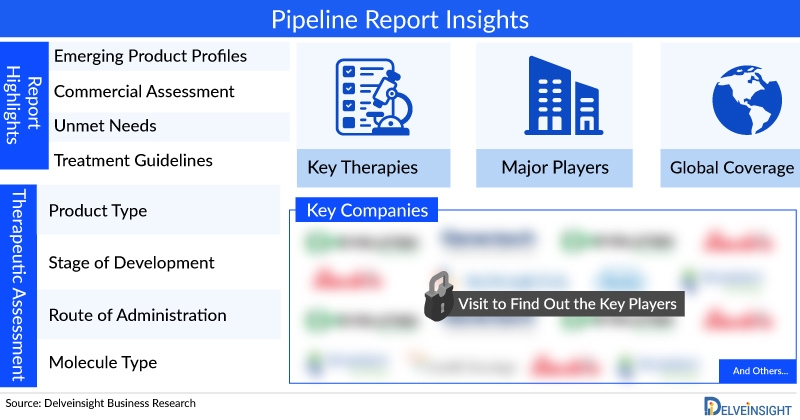DelveInsight’s “Ventricular Tachycardia – Pipeline Insight, 2025” offers a comprehensive analysis of the therapeutic pipeline, highlighting over a dozen companies actively exploring novel strategies to address both monomorphic and polymorphic VT. From next-generation antiarrhythmic drugs to targeted gene therapy and non-invasive ablation modalities, the development pipeline reflects a shift toward disease-modifying approaches rather than symptomatic control alone. Several agents are progressing through early- to mid-stage clinical trials, aiming to address unmet needs in VT prevention, suppression, and recurrence reduction.
Emerging therapies such as VX-150 (Nav1.8 inhibitor) and dronedarone analogs are being evaluated for their potential to provide rhythm control without the adverse effects associated with older agents like amiodarone. Simultaneously, efforts in gene silencing and RNA-based therapies seek to modulate arrhythmogenic substrates at the molecular level. Advancements in stereotactic radioablation are offering promise as a non-invasive alternative for refractory VT, especially for patients unsuitable for traditional ablation.
The 2025 outlook for VT therapeutics is promising, with the convergence of precision electrophysiology, imaging-guided interventions, and targeted pharmacology reshaping the management paradigm. As the focus broadens beyond acute rhythm termination to long-term disease control, the pipeline is expected to deliver safer, more effective, and personalized treatment solutions for patients with VT.
Interested in learning more about the current treatment landscape and the key drivers shaping the Ventricular Tachycardia pipeline? Click here
Key Takeaways from the Ventricular Tachycardia Pipeline Report
• DelveInsight’s Ventricular Tachycardia pipeline analysis depicts a strong space with 5+ active players working to develop 7+ pipeline drugs for Ventricular Tachycardia treatment.
• The leading Ventricular Tachycardia companies include Espero BioPharma, CTP amio Vivasc Therapeutics, Aladorian – ARMGO Pharma, RyR2 Research Program, and others are evaluating their lead assets to improve the Ventricular Tachycardia treatment landscape.
• Key Ventricular Tachycardia pipeline therapies in various stages of development include ESP 001, Vivasc Therapeutics, ARMGO Pharma, RyR2 Research Program, and others.
• In June 2025, Milestone Pharmaceuticals submitted a response to the FDA’s Complete Response Letter for CARDAMYST™ (etripamil) nasal spray, aimed at treating acute paroxysmal supraventricular tachycardia (PSVT) in adults. FDA review and PDUFA date are expected within 2 to 6 months.
• In December 2024, Field Medical announced that its FieldForce ablation system received FDA Breakthrough Device designation and was accepted into the Total Product Life Cycle Advisory Program (TAP) pilot for treating sustained monomorphic scar-related ventricular tachycardia (VT).
Ventricular Tachycardia Overview
Ventricular Tachycardia (VT) is a fast, abnormal heart rhythm originating from the ventricles, the lower chambers of the heart. It causes the heart to beat rapidly—often over 100 beats per minute—reducing its ability to pump blood effectively. VT can be life-threatening, especially if it lasts for more than a few seconds or occurs repeatedly, as it may lead to ventricular fibrillation and sudden cardiac arrest.
VT is often associated with underlying heart conditions such as coronary artery disease, cardiomyopathy, or previous heart attacks. Symptoms may include palpitations, dizziness, shortness of breath, chest pain, or loss of consciousness. Diagnosis typically involves electrocardiograms (ECG) and other cardiac tests. Treatment options range from medications and catheter ablation to implantable devices like implantable cardioverter defibrillators (ICDs) to prevent sudden death.
Find out more about Ventricular Tachycardia medication at https://www.delveinsight.com/report-store/ventricular-tachycardia-v-tach-or-vt-pipeline-insight
Ventricular Tachycardia Treatment Analysis: Drug Profile
ARM210: ARMGO Pharma
ARM210 is a small molecule designed to bind to and repair leaky ryanodine receptor (RyR) channels, as shown in laboratory studies using muscle biopsies from patients with RYR1-related myopathies (RYR1-RM). It is being developed to treat Catecholaminergic Polymorphic Ventricular Tachycardia (CPVT), a rare and potentially fatal form of ventricular tachycardia caused by mutations in the ryanodine receptor 2 (RyR2), which plays a critical role in regulating cellular calcium (Ca²⁺) homeostasis.
Learn more about the novel and emerging Ventricular Tachycardia pipeline therapies.
Ventricular Tachycardia Therapeutics Assessment
By Product Type
• Mono
• Combination
• Mono/Combination.
By Stage
• Late-stage products (Phase III)
• Mid-stage products (Phase II)
• Early-stage product (Phase I) along with the details of
• Pre-clinical and Discovery stage candidates
• Discontinued & Inactive candidates
By Route of Administration
• Intranasal
• Intrathecal
• Intravenous
• Oral
• Oral/Intravenous
• Parenteral
• Subcutaneous
• Subcutaneous/Intramuscular
• Transdermal
By Molecule Type
• Antisense oligonucleotide
• Gene therapy
• Hormones
• Neuropeptides
• Oligonucleotides
• Small Molecule
• Triglyceride
Scope of the Ventricular Tachycardia Pipeline Report
• Coverage: Global
• Key Ventricular Tachycardia Companies: Espero BioPharma, CTP amio Vivasc Therapeutics, Aladorian – ARMGO Pharma, RyR2 Research Program, and others.
• Key Ventricular Tachycardia Pipeline Therapies: ESP 001, Vivasc Therapeutics, ARMGO Pharma, RyR2 Research Program, and others.
Explore detailed insights on drugs used in the treatment of Ventricular Tachycardia here.
Table of Contents
1. Introduction
2. Executive Summary
3. Ventricular Tachycardia Pipeline: Overview
4. Analytical Perspective In-depth Commercial Assessment
5. Ventricular Tachycardia Pipeline Therapeutics
6. Ventricular Tachycardia Pipeline: Late-Stage Products (Phase III)
7. Ventricular Tachycardia Pipeline: Mid-Stage Products (Phase II)
8. Ventricular Tachycardia Pipeline: Early Stage Products (Phase I)
9. Therapeutic Assessment
10. Inactive Products
11. Company-University Collaborations (Licensing/Partnering) Analysis
12. Key Companies
13. Key Products
14. Unmet Needs
15. Market Drivers and Barriers
16. Future Perspectives and Conclusion
17. Analyst Views
18. Appendix
About DelveInsight
DelveInsight is a leading Business Consultant and Market Research firm focused exclusively on life sciences. It supports Pharma companies by providing comprehensive end-to-end solutions to improve their performance. Get hassle-free access to all the healthcare and pharma market research reports through our subscription-based platform, PharmDelve.
Media Contact
Company Name: DelveInsight
Contact Person: Jatin Vimal
Email: Send Email
Phone: +14699457679
Address:304 S. Jones Blvd #2432
City: Las Vegas
State: Nevada
Country: United States
Website: https://www.delveinsight.com/

